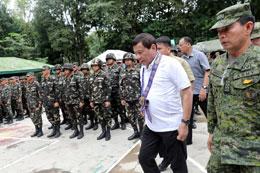Canada ready to offer humanitarian aid in Marawi

Canada's assistance to Mindanao will continue amid the war in Marawi and the declaration of martial law in the region, an official said.
Canadian Ambassador to the Philippines John Holmes said Canada "stands ready to help" as he conveyed his government and people's condolences to the government and people in Marawi after terrorists attacked the Islamic city.
"In terms of our aid program, Mindanao has been our focus the last few years and continues to be our focus. We have different programs that are already operating in Mindanao and one of them.. is we continue to contribute to the Mindanao trust fund. So that will continue," he said in an interview.
Members of local extremist groups Abu Sayyaf and Maute attacked Marawi last May 23, prompting President Rodrigo Duterte to put Mindanao under military rule.
The clashes, which are now on its 4th week, have left thousands displaced and hundreds killed.
Holmes said Canada continues to contribute to the Mindanao trust fund while other programs are ongoing as well.
He also noted that Canada is ready to provide humanitarian assistance upon the Philippine government's request
"We stand ready to help. Normally in terms of assistance, after a humanitarian or in this case a person-made disaster, we wait for instructions and request from the government of the Philippines," he said.
Holmes also said Canada is ready to work with the Philippines and offer assistance in fighting terrorism in terms of capacity building and information exchange.
"We stand ready to work with the Philippines in that regard. We don't normally... we wouldn't be sending troops or anything like that but we do capacity building, exchanges of information, things like that. That's been ongoing," he said.
Meanwhile, a Philippines politician said residents fleeing besieged Marawi City had seen scores of dead bodies in an area where intense fighting has taken place between security forces and Islamist militants over the past three weeks.
"Dead bodies, at least 100, scattered around the encounter area," Zia Alonto Adiong, a politician in the area who is helping in rescue and relief efforts, told reporters, referring to accounts he had received from fleeing residents.
The military said it could not confirm the report.
The army has said 290 people have been killed in the more than three weeks of fighting, including 206 militants, 58 soldiers and 26 civilians.
Lieutenant Colonel Jo-Ar Herrera, a military spokesman, said troops were advancing toward the commercial center of Marawi City, which is held by the militants who have sworn allegiance to Islamic State.
"We intend to finish the fight as soon as possible. Our tactical commanders are doing their best," Herrera said.
But troops still faced up to 200 fighters, many of whom had taken up sniper positions, he said.
"The battlefield is very fluid," he said.
Meanwhile, a report said Philippine President Rodrigo Duterte has withdrawn from public duties for a week because he is tired and needs to “rejuvenate”, as government forces battled Islamist militants in the biggest crisis of his rule.
Duterte, 72, has not been seen in public since Sunday and missed a scheduled appearance the following day at annual Independence Day celebrations in Manila, sparking speculation about the state of his health.
“He’s just taking some time off to rejuvenate,” presidential spokesman Ernesto Abella told reporters.
Abella said there was no date for when Duterte would resume his official duties, although he insisted the president was healthy.
“I’m saying that there’s nothing to worry about in terms of sickness,” he said. “The president is well.”
Duterte imposed martial law over Marawi and the rest of the southern region of Mindanao, home to 20mn people, on the day the fighting erupted to head off what he said was an attempt by IS to carve out its own territory there.
Abella said Duterte was taking time off because of a punishing schedule since then, which included regular visits to military camps and hospitals to support troops.
“It has been really brutal, so it is important to allow him this kind of rest,” Abella said.
Duterte had repeatedly denied during last year’s presidential election campaign that he suffered from cancer.
Nearly 300 people have been killed in the violence, including militants, government forces and civilians in the Marawi conflict.
The hostilities have also displaced more than 220,000 people and left Marawi City in ruins.
On the 24th day of the crisis, an Australian journalist covering the crisis was hurt when a suspected stray sniper bullet hit him in his neck area.
Adam Harvey, 43, of the Australian Broadcasting Corp, was inside the provincial capital compound in Marawi City when the bullet hit him. He was rushed to hospital, but declared out of danger.
Presidential spokesman Ernesto Abella urged media members in Marawi City to take precaution while doing their work.
“While I understand that you would not shirk your duty in the pursuit of any story, bear in mind that there’s no story more valuable than one’s life,” he said. “Take the necessary precautions and stay safe while covering conflicts.”
An estimated 300 to 500 civilians are still trapped in the conflict zone, according to the International Committee of the Red Cross.
“Circumstances are dire for those who are left behind,” it noted in a bulletin. “Their lives remain in danger within the fighting zone, and it’s impossible for humanitarian organisations to provide them with much needed assistance due to access and security issues.”
The Red Cross also expressed concern about the plight of the displaced, amid limited supply of food and water and lack of access to sanitation facilities.
“The rainy season has started, and this poses increased health risks to displaced families, especially children and elderly staying in evacuation centres,” it said.
“Protracted stay under such circumstances makes the more vulnerable to waterborne and communicable diseases,” the Red Cross added.






